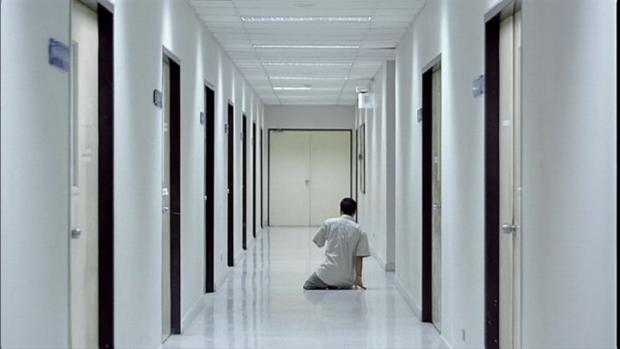Syndromes and a Century (Apichatpong Weerasethakul, Thailand/Austria/France, 2006)
When I finally sat down to watch Syndromes and a Century, my first film I’ve seen by the Thai director Apichatpong Weerasethakul, who humorously has told everyone in the world to call him simply “Joe,” I was fearful that I was sitting down for what I might fittingly call “World cinema art house syndrome.” Anyone who has watched enough Cannes film festival winners will know what I’m talking about—long dreary shots of absolutely nothing, with no relevance to the plot but also no relevance to anything at all, simply capturing what is on screen without any idea of what it all means. Some of these directors are quite good at this and do somehow create a captivating relevance—Abbas Kiarostami jumps to mind more than others. But my guess going into Joe’s film was that his was of the later category, and that’s why his two films—Syndromes and 2004’s Tropical Maliday—had made top decade lists everywhere like Cashiers du Cinema, Sight and Sound, and Film Comment.
And to a certain extent, Syndromes is a series of compositions of real life captured without any narrative drive, as we watch Joe slowly contemplating what he is shooting before him. However, to my surprise, Joe is a filmmaker who is completely aware what he is doing, and knows how to bring us into his world, no matter how baffling it might be. I will not stand up and proclaim Syndromes as the masterpiece everyone else has, or begin to interpret the film’s greater themes and ideas, but I will say that for a film I expected to hate, I found myself oddly fascinated by the images and dialogue, and especially found Joe’s shot compositions to be stunningly beautiful—this is a filmmaker who has deliberately chosen every shot with careful thinking, and never wastes a minute of our time.
As mentioned before, Syndromes has only a small formulation of a plot, as well as one very strange twist in the center of the film. The first half of the film follows two stories. It begins with a female doctor interviewing a new former military doctor who has recently received a position at their hospital in rural Thailand. We follow the female doctor as she is pursued by a man who seems to be a mental patient. At the same time, we follow the relationship between a dentist, who poses as a country singer at night, and the monk he is performing a teeth cleaning on.
And then the movie starts over with the same interview, except now we are in a high-tech Bangkok hospital, and we follow the military doctor instead. Strands of narratives are picked up and dropped from scene to scene in Syndromes, and while this could come off as frustrating, the beauty is that the individual sequences are so compact and so vibrant with not only a languid splendor but also a lot of humor. Joe’s film certainly has a logic to itself, and I think there is an understanding. In one sequence, the female doctor begins a story to her suitor to how an orchid farmer once loved her. He stops the story, not liking it, and the flashback ends, and we never hear the end of the story.
The difficulty is keeping a film like Syndromes and a Century is keeping it all tied together, especially thematically. The interesting thing though, is that I’m not really sure what Joe is trying to say with his film, but I was still captivated. The film’s repeat structure, in which scenes happen to increasing orders of difference when played in the two settings, might at first suggest an appreciation for the rural country over modernization, but such a reading is too easy, and Joe’s camera is less angered in the second half as much as it is even more curious and more fascinated by the images around him. At the end of the film, Joe’s camera stares into a dark round pipe and the blackness inside, matching an earlier shot of an eclipse. I think Joe is looking for something in these two places about how we interact and our relationship to our spaces, not preferring one to the other.
Best of all, Syndromes and a Century is often oddly hilarious. The film delivers its deadpan humor without a single wink at the camera, and it could be so easy to write off any of the humor as an accident. Yet Joe is too smart for a mistake like that, and I was surprised to find myself laughing out loud at some of the ridiculous lines that I couldn’t believe had made it into this film. Joe inserts the humor not as a gimmick, but because, like in real life, humor can be anywhere, and he is not afraid to show it.
I chose to watch Syndromes and a Century in my inevitable preparation to watch Joe’s latest film, this year’s Palm D’Or winner Uncle Boonmee Who Can Recall Past Lives, but after this fascinating film, I’m oddly curious to watch the rest of Joe’s small but fascinating filmography, as well as watch Syndromes again. This is not typical world art cinema, but someone who knows how to suck you in with a style that is uniquely original, and strangely captivating.



No comments:
Post a Comment